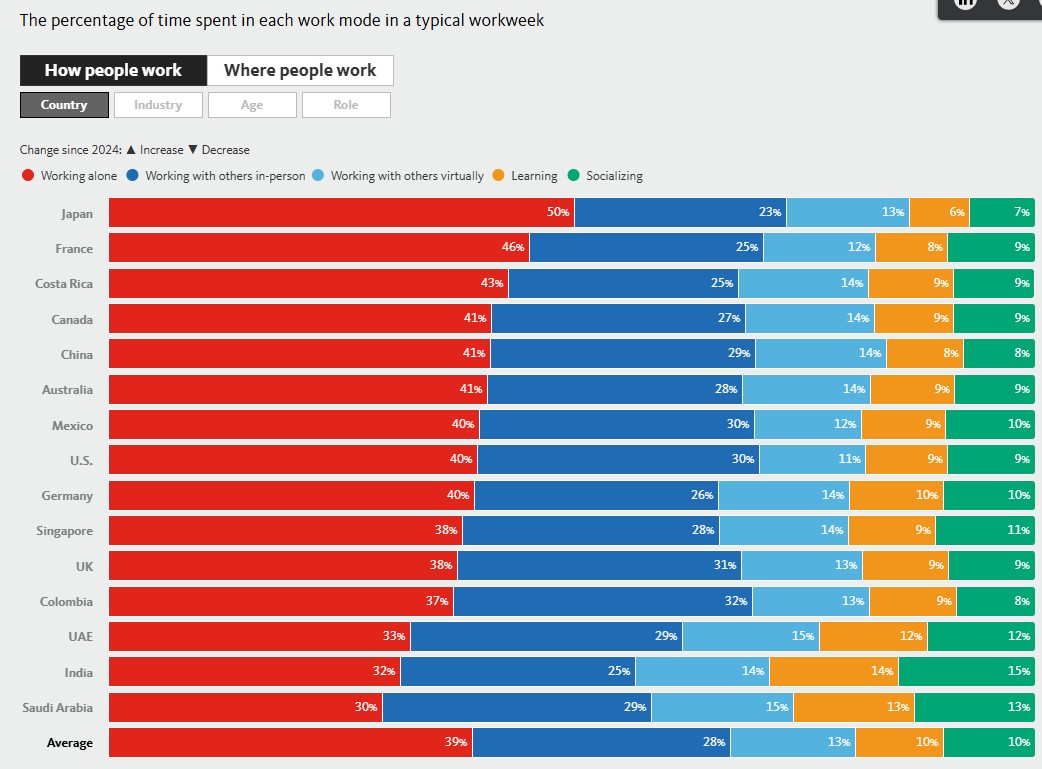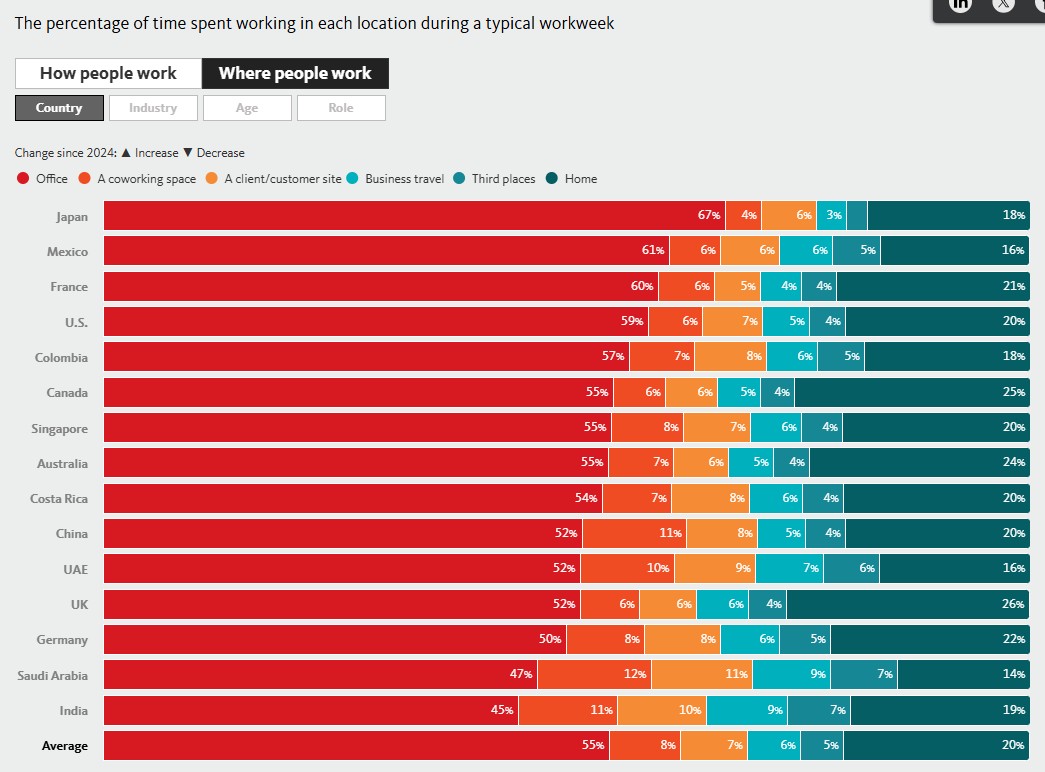
30% workers in UAE and KSA still prefer working alone despite rising WFO: Gensler Report
Employee EngagementCulture#EmployeeExperience#HRCommunity
About 30 percent of workers in the United Arab Emirates (UAE) and the Kingdom of Saudi Arabia (KSA) prefer working alone, according to the latest workplace survey by the Gensler Research Institute.
The report, titled “Global Workplace Survey 2025,” notes that the preference for working in silos has declined compared to last year’s findings, which showed that 38 percent of workers in the UAE and 36 percent in KSA preferred working alone. The report also highlights changing workplace dynamics, with a noticeable rise in return-to-office (RTO) trends over the past year.
The report, which surveyed over 16,800 full-time office workers across 15 countries and 10 industries globally, also underlined the importance of in-person work, human connection, and collaboration as key fundamentals of workplace productivity. It noted that in-person work has increased to nearly 30 percent in the UAE and KSA — higher than the global average of 27.9 percent.
“These shared experiences strengthen relationships, reinforce cultural norms, and foster a sense of community among colleagues,” the report stated.

The UAE and KSA-specific insights from the report
Solo working: About 32.7 percent of surveyed workers in the UAE prefer working alone, down from 37.6 percent in 2024. In Saudi Arabia, around 29.6 percent of workers share this preference, down from 35.9 percent in 2024. These figures are significantly lower than the global average of 39.3 percent, which has only slightly decreased from 39.5 percent in 2024.
In-person working with others: This trend is on the rise in both countries. In the UAE, 29.3 percent of employees prefer working in person with others, up from 25.7 percent in 2024. In Saudi Arabia, 29.1 percent of employees expressed the same preference, up from 21.9 percent last year. Globally, 27.9 percent of workers now prefer this mode, up from 25.8 percent in 2024.
Virtual working: Interestingly, workers in the UAE and KSA show a higher preference for working virtually with others — contrary to the global trend, where virtual collaboration is on the decline. In the UAE, 14.8 percent of workers prefer virtual collaboration, up from 13.1 percent in 2024. In KSA, 15.3 percent prefer it, up from 14.9 percent. Globally, only 13.4 percent prefer this, down from 13.7 percent.
Learning while earning: Skilling and learning while working is gaining traction in the UAE but declining globally.
In the UAE, 11.7 percent of workers are learning on the job, up slightly from 11.6 percent in 2024. In contrast, only 13 percent of workers in KSA are investing time in learning, down from 13.9 percent. Globally, the figure stands at just 9.6 percent, down from 10.2 percent.
Socializing: Social connections at work are seeing a slight dip across all surveyed nations. Only 9.8 percent of workers are socially active at work, down from 10.8 percent in 2024. In the UAE, 11.6 percent are engaging socially, down from 12 percent. In KSA, 13.1 percent are socially active, down from 13.4 percent.
Place of Work: The report also highlighted where people prefer to work.
In the UAE, 51.5 percent of workers spend their time in the office during the workweek, up from 49.1 percent in 2024. Outside of the office, 10.1 percent prefer co-working spaces (up from 9.5 percent), 8.8 percent work from client sites (down from 9.1 percent), 7.2 percent spend time in work-related travel (down from 7.9 percent), 6.1 percent work from third places (down from 7.4 percent), and 16.3 percent work from home (down from 16.9 percent).
In KSA, around 50 percent of workers spend their time in the office during the workweek, up from 42.6 percent in 2024. Outside of the office, 12.3 percent prefer co-working spaces (up from 12.1 percent), 10.8 percent work from client sites (down from 11.3 percent), 8.5 percent spend time in work-related travel (down from 9.5 percent), 7.2 percent work from third places (down from 8.8 percent), and 14.3 percent work from home (down from 15.7 percent).

Globally, 54.6 percent of workers spend time in the office, 7.6 percent in co-working spaces, 7.3 percent at client sites or offices, 5.7 percent traveling for business, 4.7 percent at third places, and 20.1 percent work from home during the workweek.
Commenting on the UAE insights, Edith Eddy, Senior Interior Designer, Workplace, at Gensler Middle East said, “The UAE has become a global benchmark for ambition and adaptability. In cities like Dubai and Abu Dhabi, we are witnessing rapid shifts in how people live and work, and the workplace must evolve accordingly."
Adding, "Our research reveals a clear gap between what employees need to thrive — flexibility, creativity, and connection — and what their current spaces provide. Bridging this gap will be essential for organisations aiming to attract talent, foster innovation, and design workplaces that truly support the future of work in the Emirates.”
What do employees need in the workplace?
The report also underlined practical measures to improve the workplace vibe so employees actively engage, feel good about working from the office, and foster human collaboration. Some of the measures include:
- Eliminate common workplace pain points such as noise, limited room availability, and inefficient layouts. Employees want quieter focus areas, better meeting acoustics, and more informal collaboration spaces.
- Shift away from rigid corporate setups like formal “business hubs,” as workers now idealize creative labs and nature retreats—spaces that are flexible, calming, and designed to foster innovation and wellbeing.
- Working from the office is about more than just showing up, it’s about meaningful experiences. Focus on building key motivators like team meetings, private conversations, and face time with leadership.
- For coworking setups, ensure the space includes cafés, coworking zones, quiet rooms, libraries, and innovation hubs, as employees strongly prefer informal and flexible environments over simply having a place to work.
- Provide workplaces within vibrant, community-oriented neighborhoods that offer walkable access to coffee shops, medical centers, green spaces, and places of worship.









